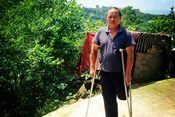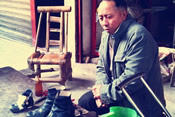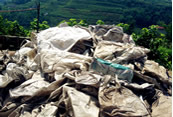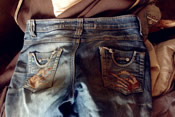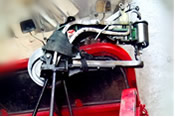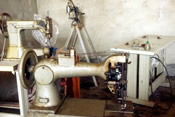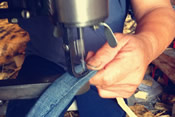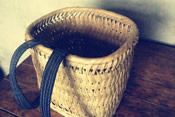
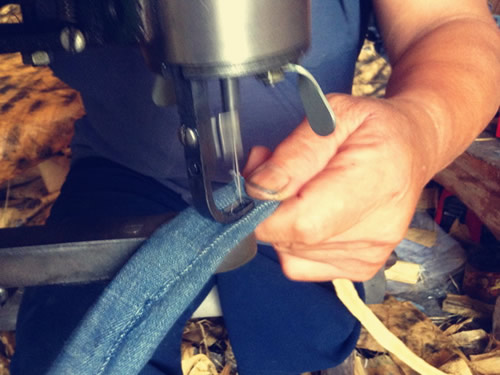 |
| Sewing shoulder straps. (Wei Luodong/PCD) |
By Tan Youchang, Zou Zhongqiong, Huang Lijiao (Ning Tai Community Project Programme Staff)
|
Editor's Notes Xiao Er Township in Gong County, Yibin in Sichuan Province was besieged by garbage in the past, and 8 years ago, PCD started supporting the township to implement a waste separation program. After years of effort, certain successes have been achieved - hygiene awareness among villagers has been improved and they have also started to learn that their efforts could help reduce greenhouse gas emissions. The latter part of the project went beyond composting to develop biogas digesters for energy production. This project is still continuing, taking many more steps beyond garbage separation, with a view to further solving the garbage problem as well as introducing the ideas of sustainable living. Two of the project directions are to explore ways to reduce garbage at the source, and to find sustainable ways to use the community's garbage as a resource, so as to create a circular economy that turns waste into treasure. Just when the project personnel were racking their brains about what further measures to take, they chanced upon an old man with disabilities, who had been making his living by sewing and mending in Ning Tai community of Xiao Er Township. He had come up with the ingenious idea of turning discarded gunny sacks and trousers into beneficial resources for farmers. The way he values all things reduces damage to the environment, and at the same time allows him to make a living. While reducing waste, Yu had also discovered a way to establish a circular economy. PCD supported Ning Tai community's activities by advocating and educating the people on used clothes recycling. The organisation also supported the collaboration with community members to sort out and classify their used clothing, and helped environmental hygiene workers to collect used clothes for Yu when they were collecting garbage, and to gather resources to help other families start their own mini workshops. |
Meet Mr Yu Baoshu
We never expected to enter the humble life of this disabled but strong-willed person. We also never expected that his handiwork of turning used clothing into something useful would be something that would connect everyone in his community together.
When we were pre-occupied with waste separation in Chang Zhen township, everyone's attention was on the river's hygienic condition, street cleanliness, and on how to collect, heap, separate, transport, and bury garbage. However, we eventually realised that we could bury no more garbage. The sheer volume of garbage was overwhelming and could not be degraded. The thermal power plant disposes of huge amounts of gunny sacks after using them for coal washing, and the town also was sending all of its residents' discarded clothing straight to landfill.
So, what could be done?
A progressively affluent city in a spree of craving, buying, discarding and burying
One generation ago, when families had many children and were not so well off, everyone wore old and torn clothing, altered clothing passed on from older siblings and then passed on again, or used clothing handed on by their neighbors. By washing and drying, stitching and patching time and again, people showed their appreciation for both people and resources.
Now, every only-child is a precious little gem in the family. People change what they and their children wear all the time. Nobody wears used clothes anymore and there is no more hand-me-down clothing. People nowadays consider giving out old clothes to be disrespectful, and those on the receiving end are reluctant to accept them. With improved living standards, everything has to be new and fashionable, whether it is for a new born, an elderly person, or for oneself. Thanks to domestic demand expansion policies that encourage consumption, mass internet shopping sites and fast-moving logistics, township residents are all craving, buying, discarding and burying their clothing.
Desire for the next new fashion grows like crazy. The few sew and mend shops quietly disappeared, the handful of cobblers at the head of the bridges and at the end of the streets are so heavily crushed by the market, and can only await opportunities to divert to other trades. Gradually no one is giving and mending, and eventually no one will know how to mend.
What shall we do?
Clothing can’t be exchanged at clothing swaps; hand-me-down clothes are turned away; nobody knows how to alter clothes any more. Just when everyone in PCD’s community project was thinking hard about what to do next, environmental hygiene worker Hu Yunkuan said when he was collecting refuse, he picked up discarded trousers and sold them to disabled cobbler Yu Baoshu at 5 cents a pair.
So, one market day in January, 2015, we met up with Yu in the street. He was a person of few words and expressions then, with his manual shoe-mending machine still tied on his cart. Reclining on a bench, he lit up his pipe, answering us sporadically while dipping into glue to mend a lady's boot.
New clothing replacing the old, no future in sewing and mending
It was obvious that business wasn't good, and that there was nothing special about the old man, apart from having only one leg. Before we left, we asked him about the market price for making shoulder straps from discarded clothing. Later, when we wanted to talk to him about possible cooperation, we found ourselves in his tiny yard. His front and back yards were both planted with fruits and vegetables, and there were a few dozen hens behind a fence, heaps of gunny sacks from the power plant, shelves at the left of his house filled with old trousers, order in disorder, he was clearly a hard-working man.
Once upon a time, he was a stonemason, the breadwinner of the family. Yu Bao Shu is now sixty. When he was in his thirties, he slid from a roof and broke his left leg. He did not complain about the amputation, nor did he give up on life, but just picked up a pair of clutches and became the apprentice of an old cobbler. That was the start of his next thirty years’ sewing and mending career.
Market day was his busiest time. He threw his shoe mending machine on his shoulders, then walked the streets and alleys shouting to announce his services. After ten years of shoe-mending, his life finally started to flourish.
Then in the next ten years, Yu realised that people were throwing away their shoes instead of mending them, leaving him to wonder what he could live on.
The shoulder straps for dossers (baskets carried on the back), which he made from discarded gunny sacks and trousers with his skillful hands, were well received by the villagers, for they were not only sturdy and tough, but also comfortable and attractive, unlike those made of rope and straw, which were easily ruined once they got wet. Besides, the traditional materials were becoming hard to come by. From then on, he launched himself into a new direction – using discarded fabric to make villagers dosser straps.
Still the same person, still the same old manually operated machine whose sewing needles and threads broke easily, he worked extra hours to make over 150 sets of back straps each month to sell.
The shift of the mind that turned discarded clothing into a valuable resource
Mr. Yu is tough and flexible, just like the shoulder straps that he makes. Knowing that we were coming to visit, he rode his tricycle-cart to pick us up. Unlike the first time we met, he had a big smile on his face. His small collection of motorised cobbling machines was already a small workshop by his standards, though he hadn’t plugged them in yet. He noticed our amazement, and explained that he had borrowed over three thousand yuan to buy these machines from the thermal power station, in order to save himself time and energy in making shoulder straps, so that he could have more time to sleep.
We asked him about the sales of the dosser straps, whether they sold well, whether he had enough material supply and whether he had the energy to keep up with demand. He said:
“I now have wholesaling points in the agricultural markets of Gong Xian, Yun Lian, Gao Xian, Jia Luo, and Zan Tan. I home deliver the straps for three yuan a pair, and I cannot keep up with demand. For orders from far away, I send a parcel to them with 300 pairs all in one go once a month; for nearby orders, I deliver for orders from 50 to 100 pairs. Villagers can bring in a pair of old trousers and exchange them for a pair of straps. The gunny sacks discarded by the thermal power plant are way too many, so are the trousers discarded by community members. I use the gunny sacks as material for the soft but strong and enduring inter layer, then the clothing for the outer coat to provide comfort. The two compliment each other. These straps could outlive three to four dossers before their time is done.
Environmental hygiene worker Hu Yunkuan has been picking up four to five hundred pairs of discarded trousers for me each month, yet they are still not enough. I still have to scavenge around myself. Satin and silk trousers are not useful for this purpose, as they are difficult to work on and straps made of them break easily; those made from white trousers got dirty too quickly and villagers dislike them; trousers from garbage dumps are too dirty. Cleaning them incurs too high a cost and my legs are disabled. As for shirts, they are too short and can cause lumps on the straps and make them uncomfortable to wear.
However, the agricultural sprayers that villages are using also have design defects – their straps are too thin and cut into people’s shoulders. I am now trying to use shirts and the trim-off from trousers to make straps for these sprayers.
Waste reduction offers opportunity for new livelihood
I think this way of transforming discarded clothing is benefits for the peasants. The environmental hygiene workers also earn extra income by selling me the old clothes they collect. It helps to reduce the waste in the community and provides a new way of making a living for myself and my family. This mutual support and benefit allows the project to be long lasting and sustainable.
I certainly do not have the energy for all this on my own. My partner left a while ago, my son is working in Tianjin, and my grandson is still small. Fortunately, my daughter-in-law is still helping. Every month I still go to clean the village roads and drag back the garbage. On market days I have to go to the streets to mend shoes, even though the business is slow. Nevertheless, I could not give up shoe-mending, because if I did, there would be even fewer people getting their shoes mended.”
Mr. Yu's words are still echoing in my ears, and a string of questions are going around my head: how much we have thrown away, what should be chucked and what not, what is refuse, what is resource, what is skilled trade, what is a livelihood, what is mutual help and benefit, how does the countryside interact with the city...
When facing the problems of discarded clothing, glass, plastic, batteries, electrical appliances and kitchen waste, we really need a lot more ‘Yu Baoshus’ to create new things from waste materials and develop new businesses. If this is not for you, then you must at least have things that could be reused, so please sort your waste so that it can be transformed into new resources. In this way, you can help your own community to transform itself.


